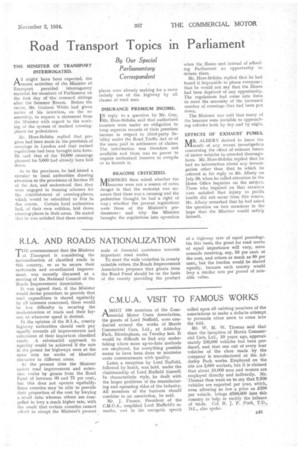Road Transport Topics in Parliament
Page 63

If you've noticed an error in this article please click here to report it so we can fix it.
By Our Special Parliamentary Correspondent
THE MINISTER OF TRANSPORT INTERROGATED.
As might have been expected, the recent activities of the Minister of Transport provided iriterrogatory material for members of Parliament on the first day ofthe resumed sittings after the Summer Recess. Before the recess, Mr. Graham White had given notice of his intention, on the reassembly, to request a statement from the Minister with regard to the working of the system of marked crossingplaces for pedestrians..
Mr. Hore-Belisha replied that progress bad been made in the provision of crossings in London and that revised regulations had been brought into force. He said that of the 10,000 crossings planned for 5,000 had already been laid down.
As to the provinces, he had issued a circular to local authorities thawing attention to the provisions of Section 18 of the Act, and understood that they were engaged in framing schemes for the establishment of crossing-places, which would be submitted to him in due coarse. Certain lotal authorities had, of their own volition, laid down crossing-places in their areas. He stated that he was satisfied that these crossing places were already making for a more orderly use of the highway by all classes of road user.
INSURANCE PREMIUM INCOME.
I N reply to a question by Mr. Guy, Mr. Hore-Belisha said that authorized insurers were tinder no obligation to keep separate records of their premium income in respect to third-party liability under the Road Traffic Act or of the sums paid in settlement of claims. The information was therefore not available and there was no power to reqUire authorized insurers to compile or to 'furnish it.
BEACONS CRITICIZED.
]EMBERS then asked whether the. IVIbeacons were not a source of extra danger in that the motorist was unaware that there was a crossing and the pedestrian thought he had a right of way ; whether the Present regulations were those of the Minister's predecessors; and why the Minister brought the regulations into operation when the House met instead of affording Parliament an opportunity to debate them.
Mr. Hore-Belisha replied that he had found it impossible to please everyone; that he would not say that the House had been deprived of any opportunity. The regulations had come into force to meet the necessity of the increased number of crossings that had been put down.
The Minister was told that many of the beacons were invisible to approaching vehicles both by day and by night.
EFFECTS OF EXHAUST FUMES.
MR. ALBERY desired to know the result of any recent investigatien concerning the effect of exhaust fumes of motor vehicles in crowded thoroughfares. Mi. Hore-I3elisha replied that Ile had no information about any investigation other than that to which he referred in his reply to Mr. Albery on July 30, when he called attention to the Home Office inquiries on the subject. Those who inquired on that occasion were satisfied that injury to public health did not occur from this source. Mr. Albery remarked that he had asked the question on two occasions in the hope that the Minister would satisfy himself.




































































































